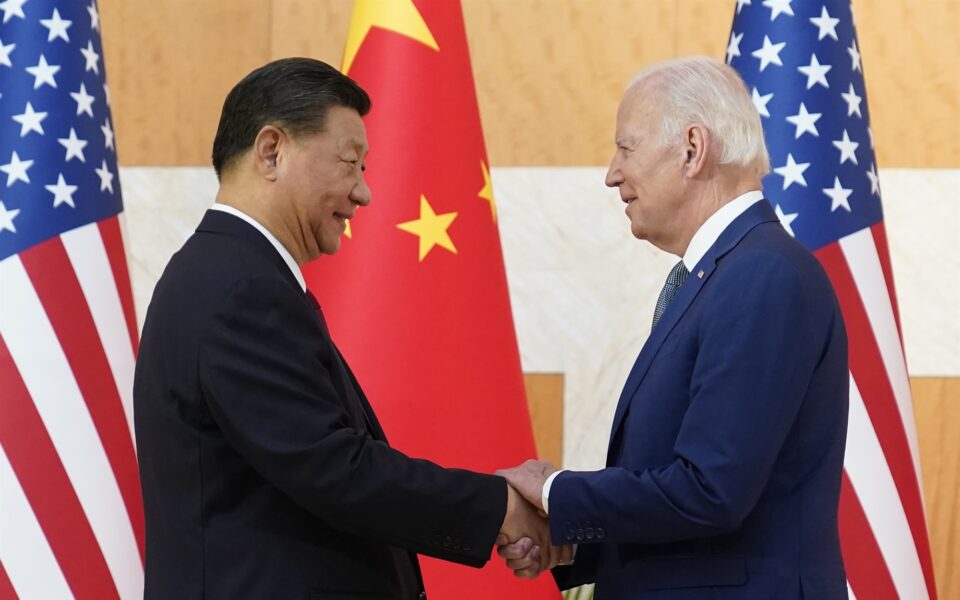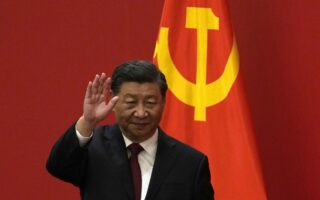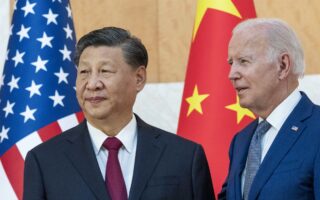US-China ties are improving. It won’t last

Over the past few weeks, US and Chinese officials have proven more willing to talk. That’s good news for both countries and for the global economy. But the desire of both sides to avoid costly near-term fights doesn’t mean that anything has really changed at the heart of their increasingly contentious rivalry. Next year will offer new tests that deserve close attention.
For now, the positive signs are real. US and Chinese officials are planning for the first face-to-face meeting of presidents Joe Biden and Xi Jinping in more than a year, on the sidelines of the APEC summit next month in San Francisco. There has already been a surge in recent high-level meetings between US and Chinese diplomats, finance officials and trade representatives in formats not so different from the “strategic and economic dialogue” meetings of the past. There have even been discussions on hot-button subjects like artificial intelligence.
There are no diplomatic breakthroughs on the horizon, but regular communication can help ease tensions that have risen sharply since the breakdown in communication that grew worse as the pandemic began.
The relationship is improving because both governments have urgent domestic challenges at the moment. Neither can afford the kind of great power confrontation that might make those challenges more dangerous and more expensive. China’s economy has stumbled badly since the lifting of the Covid lockdowns that sharply slowed China’s economy. Youth unemployment has reached levels that persuaded Chinese officials to stop publicly reporting the latest numbers. Beijing can also see that its more aggressive foreign policy of recent years has united many of its rivals in resistance. Japan and South Korea are overcoming long-standing differences to better cooperate on security and trade policy. India has moved closer to the United States and joined with the US, Japan and Australia in efforts to push back against the expansion of China’s influence. The war in Ukraine has brought the US and Europe much closer together, at least for now, an added complication in Beijing’s bid to ensure that Western powers never fully coordinate their policies toward China.
The US, meanwhile, has entered an election season that may prove exceptionally ugly and dangerous, even by American standards. The chaos with the US House of Representatives that led to the ouster of House Speaker Kevin McCarthy, a first in American history, has raised grave doubts that the Biden administration can continue to finance its expensive agenda, including its support for Ukraine. Fears of a slowing economy in 2024 are growing.
In short, presidents Xi and Biden could both use a period of calm and predictability in their most important international relationships to allow them to focus on headaches at home.
Presidents Xi and Biden could both use a period of calm and predictability in their most important international relationships to allow them to focus on headaches at home
But there are structural reasons why we shouldn’t expect Washington and Beijing to remake their relations for the better. On the US side, Democrats and Republicans don’t agree on much, but they do share the view that China poses a threat to American interests that must be addressed. This conviction is most obvious on technology policy. The US has expanded export controls on products that are “dual-use” (useful for both civilian and military purposes). The inclusion of advanced semiconductors on the control list is critical, because they are essential elements in the development of next-generation artificial intelligence. US export controls will prevent China from developing AI products powerful enough to revolutionize productivity in nearly every economic sector. In short, until China can develop its own advanced chips, perhaps a decade or more from now, the US will try to deny China access to the components necessary for 21st century economic power. Over the long-term, that’s a declaration of economic warfare against China, and there is little political incentive in Washington to back away from this strategy.
Nor has Xi changed his long-term priorities, even if in some cases he will be patient in pursuing them. He remains determined to push back against perceived efforts by the US and its allies to stunt China’s natural growth and contain its rise on the global stage. The August publication of a new Chinese map of the South China Sea demonstrates that it maintains its territorial claims there, whatever the neighbors and the Americans say.
Of greatest concern, Xi continues to insist the problem of Taiwan can’t continue to be passed from one generation of Chinese leaders to the next. In January, Taiwan will hold national elections. Its likely next president is Democratic Progressive Party nominee (and current vice president) William Lai, a candidate Beijing has worked hard in recent months to undermine. In the runup to the vote, China has used both trade inducements and shows of military force to boost opposition Kuomintang leader Hou Yu-ih. If, as expected, Lai wins, Taiwan can expect far fewer offers from Beijing and many more threats. We could even see a sharp escalation in pressure from China’s military that includes naval provocations that test Taiwan’s rules of engagement and even enforced inspections of Taiwan-bound shipping. The risk of a confrontation at sea or in the skies above the Taiwan Strait that escalates further than China, Taiwan or the US wants is growing, even if the risk of war remains low for now.
This doesn’t mean that near-term better US-China relations are meaningless. The Biden-Xi meeting next month in San Francisco can help open new channels of communication that will be much-needed in coming years. But the basis of the world’s most important bilateral relationship remains on shaky ground, and that won’t change for the foreseeable future.
Ian Bremmer is the president and founder of Eurasia Group and GZERO Media, and the author of “The Power of Crisis.”





